Unit 09 Body Language 知识点总结
- 格式:docx
- 大小:102.42 KB
- 文档页数:10
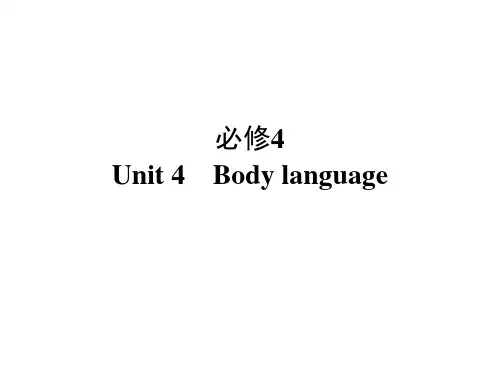
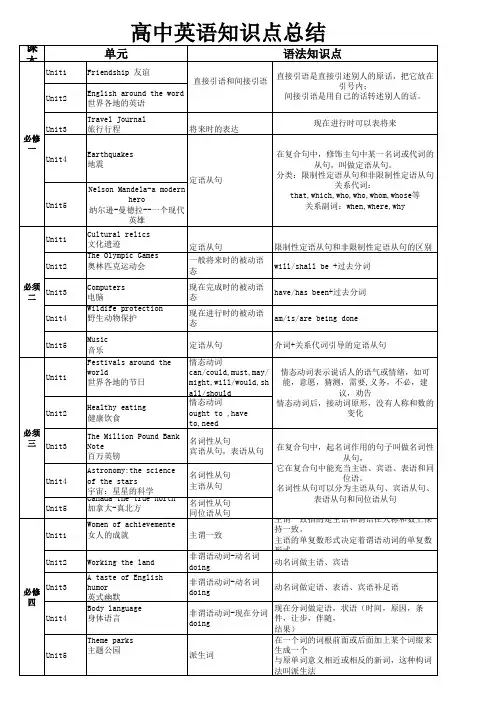
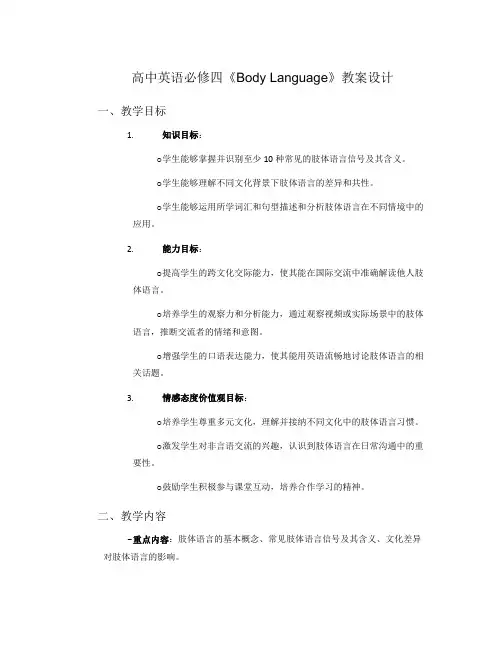
高中英语必修四《Body Language》教案设计一、教学目标1.知识目标:o学生能够掌握并识别至少10种常见的肢体语言信号及其含义。
o学生能够理解不同文化背景下肢体语言的差异和共性。
o学生能够运用所学词汇和句型描述和分析肢体语言在不同情境中的应用。
2.能力目标:o提高学生的跨文化交际能力,使其能在国际交流中准确解读他人肢体语言。
o培养学生的观察力和分析能力,通过观察视频或实际场景中的肢体语言,推断交流者的情绪和意图。
o增强学生的口语表达能力,使其能用英语流畅地讨论肢体语言的相关话题。
3.情感态度价值观目标:o培养学生尊重多元文化,理解并接纳不同文化中的肢体语言习惯。
o激发学生对非言语交流的兴趣,认识到肢体语言在日常沟通中的重要性。
o鼓励学生积极参与课堂互动,培养合作学习的精神。
二、教学内容-重点内容:肢体语言的基本概念、常见肢体语言信号及其含义、文化差异对肢体语言的影响。
-难点内容:如何在具体情境中准确识别并解读复杂的肢体语言信号,以及如何在跨文化交流中有效运用肢体语言。
三、教学方法-讲授法:介绍肢体语言的基本概念和理论知识。
-讨论法:分组讨论不同文化背景下肢体语言的差异,分享个人经验。
-案例分析法:通过观看视频片段,分析具体情境中的肢体语言。
-多媒体教学:利用、视频和音频资源,丰富教学内容,提高学生的学习兴趣。
四、教学资源-教材:《高中英语必修四》-教具:多媒体投影仪、电脑-多媒体资源:肢体语言相关视频、课件、音频材料-实验器材:无五、教学过程六、课堂管理1.小组讨论:每组分配明确的任务,确保每位学生都有参与机会。
设定时间限制,避免讨论偏离主题。
2.维持课堂纪律:通过设定课堂规则,如举手发言、尊重他人意见等,维持良好的课堂秩序。
3.激励学生:对积极参与课堂活动和表现突出的学生给予表扬,激发学生的积极性和参与热情。
七、评价与反馈1.课堂小测验:通过选择题或填空题的形式,测试学生对肢体语言基本知识的掌握情况。
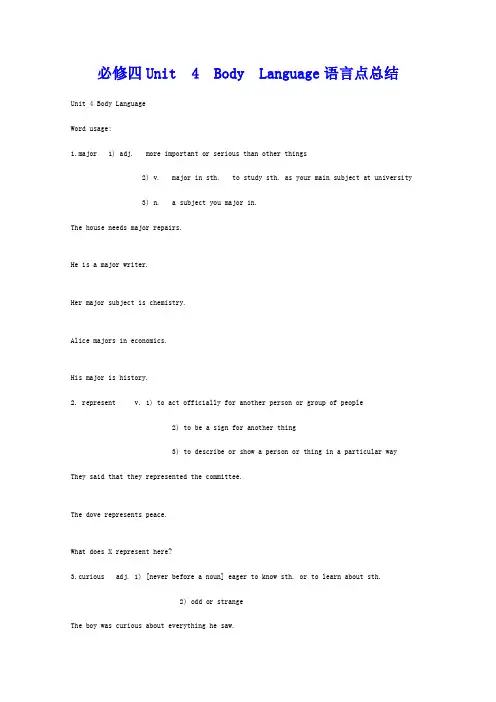
必修四Unit 4 Body Language语言点总结Unit 4 Body LanguageWord usage:1.major 1) adj. more important or serious than other things2) v. major in sth. to study sth. as your main subject at university3) n. a subject you major in.The house needs major repairs.He is a major writer.Her major subject is chemistry.Alice majors in economics.His major is history.2. represent v. 1) to act officially for another person or group of people2) to be a sign for another thing3) to describe or show a person or thing in a particular way They said that they represented the committee.The dove represents peace.What does X represent here?3.curious adj. 1) [never before a noun] eager to know sth. or to learn about sth.2) odd or strangeThe boy was curious about everything he saw.We were curious about where she’d gone.I heard a curious noise last night.4. experience 1) n. a) [U] knowledge or skill which comes from doing or feeling sth. fora long time rather than from booksb) [C] sth. that happens to you and has an effect on your mind and feelings2) vt. to feel or to be influenced by sth. that happensShe had no experience of life at all.Have you had any experience of teaching English?Please tell us about your experiences in Africa.I had a rather odd experience the other day.We have experienced many defeats, but we believe that we will succeed.5. introduce v. make (a person) know to others; bring into useI introduced John to Mary last year, and now they are married.Would you please introduce yourself?Potatoes were introduced into Europe from South America.6. approach 1) vt. come nearer to; set to do2) n. the act of coming nearer; accessSilently we approached the enemy’s camp.The time is approaching when we will have to leave.The approach of winter brings cold weather.7. express 1) vt. put into words; show feelings;2) n. fast train or delivery; a rapid, efficient system for the delivery of goods and mailHe can not express how he felt about the matter.Could you express yourself in English?Send the letter by express.8. action n. deed or conduct; process of doingActions speak louder than words.We are tired of talking about the problem---now is the time for action.The police had to take firm action to deal with the case.9. general adj. involving or applying to all persons or things of a group or category; concerning the overall aspects of a subjectThere is a general feeling that this law isn’t working properly.The school gives a good general education.Worry about high food prices has now become fairly general.10. avoid v. keep away from; preventI avoided him as much as possible.They all avoided mentioning that name.She braked suddenly and avoided an accident.11. comedy n. amusing play or film; amusing incidentOne of his new comedies is to be presented.Do you prefer comedy or tragedy?There will be a comedy show in TV this evening.12. misunderstand v. unable to understand the correct meaning; misinterpretHis intentions were misunderstood.He misunderstood what I said.They pretended to misunderstand my complaint.13. similar adj. showing resemblance; resembling but not the same; of the same kind or amountHis problem is similar to yours.My view is similar to hers.They had similar opinion.14. expression n. communication of an idea, emotion, etc.; the manner that expresses feelingI sent them flowers as an expression of thanks.There was no expression on her face."Shut up" is not a polite expression.15. agreement n. accord or harmony of opinion and way of thinking; treatyMy parents are in agreement on what color to paint the house.The three sides reached an agreement to stop the war.We are in agreement with their decision.16. chest n. part of the body wrapped by ribs and the breastbone; big strong box for storing things in; treasury of a public institution.He has a severe pain in the chest.He’s got a weak chest.I keep the tea in a chest.18. gesture n. movement of the body to express an idea, intentions or attitude.v. to make a gesture.We hold a party for our new colleagues as a gesture of friendship.Handshake is a gesture of friendship.She was gesturing so excitedly that I knew something was wrong.19. adult 1) n. group-up or mature person2) adj. grow-up or matureHe'd spent all his adult life in the army.Sam is a rather adult child.In this sense, children and adults have equal rights.20. punish v. to inflict penalty onMotorists should be severely punished for speeding.The teacher punished her students for cheating in the exam. He has never been punished by his parents.。
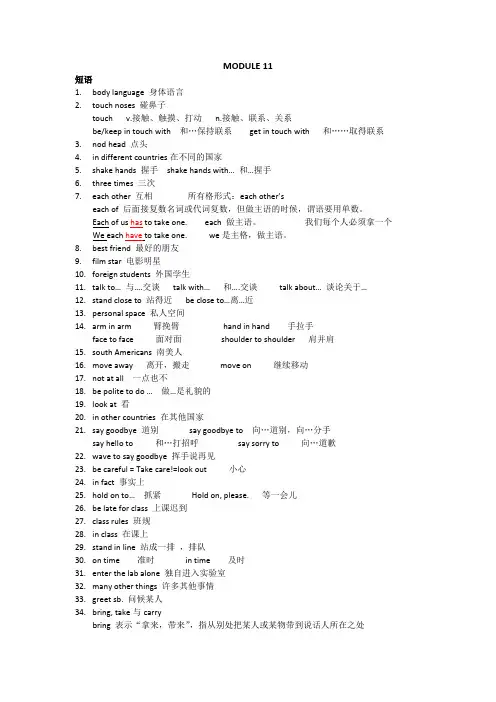
MODULE 11短语1.body language 身体语言2.touch noses 碰鼻子touch v.接触、触摸、打动n.接触、联系、关系be/keep in touch with 和…保持联系get in touch with 和……取得联系3.nod head 点头4.in different countries在不同的国家5.shake hands 握手shake hands with… 和…握手6.three times 三次7.each other 互相所有格形式:each other’seach of 后面接复数名词或代词复数,但做主语的时候,谓语要用单数。
Each of us has to take one. each 做主语。
我们每个人必须拿一个We each have to take one. we是主格,做主语。
8.best friend 最好的朋友9.film star 电影明星10.foreign students 外国学生11.talk to… 与….交谈talk with… 和….交谈talk about… 谈论关于…12.stand close to 站得近be close to…离…近13.personal space 私人空间14.arm in arm 臂挽臂hand in hand 手拉手face to face 面对面shoulder to shoulder 肩并肩15.south Americans 南美人16.move away 离开,搬走move on 继续移动17.not at all 一点也不18.be polite to do … 做…是礼貌的19.look at 看20.in other countries 在其他国家21.say goodbye 道别say goodbye to 向…道别,向…分手say hello to 和…打招呼say sorry to 向…道歉22.wave to say goodbye 挥手说再见23.be careful = Take care!=look out 小心24.in fact 事实上25.hold on to… 抓紧Hold on, please. 等一会儿26.be late for class 上课迟到27.class rules 班规28.in class 在课上29.stand in line 站成一排,排队30.on time 准时in time 及时31.enter the lab alone 独自进入实验室32.many other things 许多其他事情33.greet sb. 问候某人34.bring, take与carrybring 表示“拿来,带来”,指从别处把某人或某物带到说话人所在之处take 表示“带走,拿走”,指从说话人所在地把某人或某物带走或拿走carry仅表示“携带,带着”,不含方向句子:1. That’s because people do different things in different countries. 那是因为不同国家的人们做法不同。
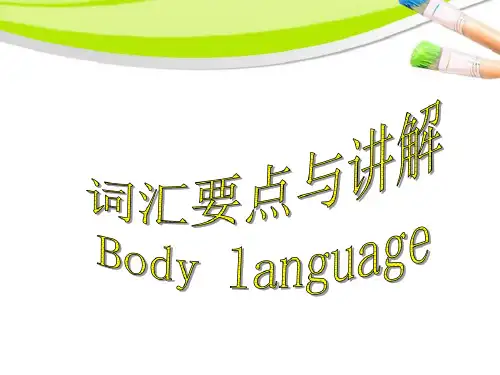

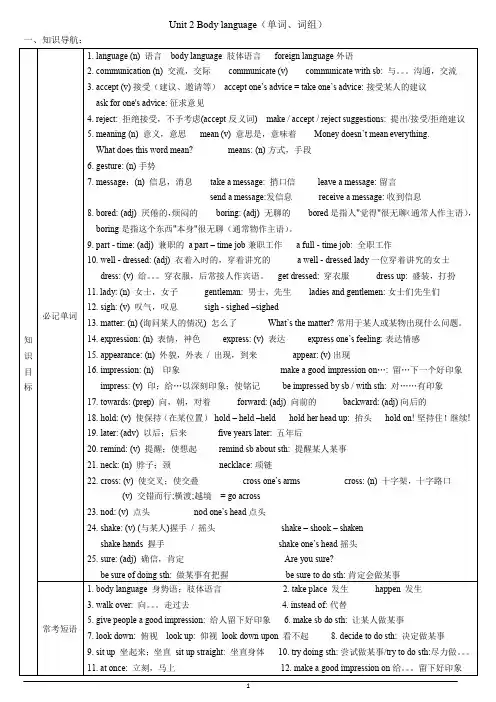
Unit 2 Body language(单词、词组)一、知识导航:二、要点全解:1. angry(生气的), excited(感到兴奋的), happy(高兴的), surprised(惊讶的) (1) angry (adj) 生气的angrily (adv)anger (n)be angry with sb: 生某人的气跟踪练习: “Why are you late for school again?” said his teacher . (angry)(2) excited (adj) 感到兴奋的,多指人对事物的感受,主语一般为人。
be excited about / at / by sth: 对。
感到兴奋e.g.: I am excited about the film. 我对这部电影感到兴奋。
【拓展】exciting (adj) 令人兴奋的,多指事物对人的影响,一般修饰物。
e.g.: Have you heard of the exciting news? 你听说那个令人兴奋的消息了吗? 【一言辩异】I was very excited after watching the exciting football match.观看了那场令人兴奋的足球比赛后,我感到非常兴奋。
(3) happy (adj) 高兴的 反义词: unhappyhappily (adv)happiness (n)(4)surprised (adj) 惊讶的多指人对某事感到惊讶,主语一般为人。
be surprised to do sth: 吃惊的做某事 be surprised at sth: 对某事感到惊讶be surprised + that 从句: 惊奇。
I am surprised to hear you say that.【拓展】① surprising: (adj) 令人惊讶的,表示某物令人惊讶。
It is a rather surprising achievement. 它真是个令人惊异的成就。
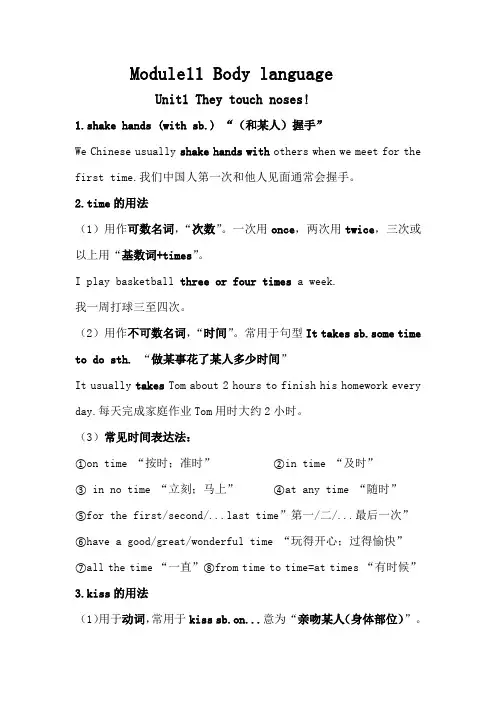
Module11 Body languageUnit1 They touch noses!1.shake hands (with sb.) “(和某人)握手”We Chinese usually shake hands with others when we meet for the first time.我们中国人第一次和他人见面通常会握手。
2.time的用法(1)用作可数名词,“次数”。
一次用once,两次用twice,三次或以上用“基数词+times”。
I play basketball three or four times a week.我一周打球三至四次。
(2)用作不可数名词,“时间”。
常用于句型It takes sb.some time to do sth.“做某事花了某人多少时间”It usually takes Tom about 2 hours to finish his homework every day.每天完成家庭作业Tom用时大约2小时。
(3)常见时间表达法:①on time “按时;准时”②in time “及时”③ in no time “立刻;马上”④at any time “随时”⑤for the first/second/st time”第一/二/...最后一次”⑥have a good/great/wonderful time “玩得开心;过得愉快”⑦all the time “一直”⑧from time to time=at times “有时候”3.kiss的用法(1)用于动词,常用于kiss sb.on...意为“亲吻某人(身体部位)”。
Mrs Brown k issed her daughter on her nose.布朗夫人亲了一下她女儿的鼻子。
(2)用于名词,常用于give sb a kiss“给某人一个吻”。
Mrs Brown gave her daughter a kiss to say good night.布朗夫人亲了一下女儿说晚安。
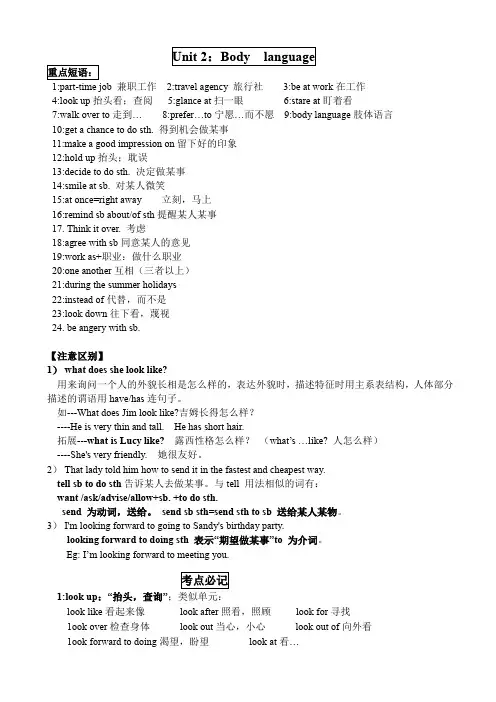
1:part-time job 兼职工作2:travel agency 旅行社3:be at work在工作4:look up抬头看;查阅5:glance at扫一眼6:stare at盯着看7:walk over to走到… 8:prefer…to宁愿…而不愿9:body language肢体语言10:get a chance to do sth. 得到机会做某事11:make a good impression on留下好的印象12:hold up抬头;耽误13:decide to do sth. 决定做某事14:smile at sb. 对某人微笑15:at once=right away 立刻,马上16:remind sb about/of sth提醒某人某事17. Think it over. 考虑18:agree with sb同意某人的意见19:work as+职业:做什么职业20:one another互相(三者以上)21:during the summer holidays22:instead of代替,而不是23:look down往下看,蔑视24. be angery with sb.【注意区别】1)what does she look like?用来询问一个人的外貌长相是怎么样的,表达外貌时,描述特征时用主系表结构,人体部分描述的谓语用have/has连句子。
如---What does Jim look like?吉姆长得怎么样?----He is very thin and tall. He has short hair.拓展---what is Lucy like? 露西性格怎么样?(what’s …like? 人怎么样)----She's very friendly. 她很友好。
2)That lady told him how to send it in the fastest and cheapest way.tell sb to do sth告诉某人去做某事。
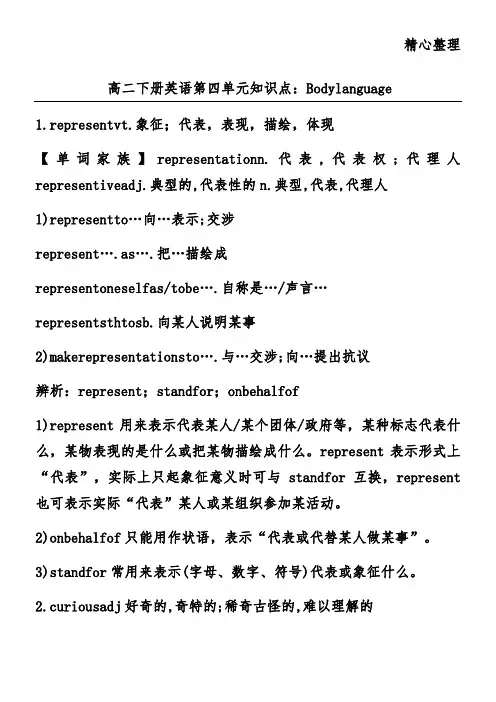
精心整理高二下册英语第四单元知识点:Bodylanguage1.representvt.象征;代表,表现,描绘,体现【单词家族】representationn.代表,代表权;代理人2)onbehalfof只能用作状语,表示“代表或代替某人做某事”。
3)standfor常用来表示(字母、数字、符号)代表或象征什么。
2.curiousadj好奇的,奇特的;稀奇古怪的,难以理解的【单词家族】curiosityn.好奇心,求知欲;奇物,珍品1)becurioustodosth极想做某事becuriousaboutstn对…感到好奇becurious+that从句…很反常着重beeagerfor“渴望”。
3)worried作“担忧”时,与anxious基本相同。
常用:beworriedabout…为…发愁/着急。
【直击高考】1.Don'tbetoo____aboutthingsyouarenotsupposedtoknow.(NMET/上海/1998)A.strangeB.amusingC.curiousD.conscious2.aboutwildplantsthattheydecidedtomakeatriptoMadagascarforf urtherresearch.(05江苏)天津)4.—attheap proachof…在…快到的时候anapproachto接近;…的方法/途径/态度approachsth./sb.靠近;接近某物/人makeanapproachetosb.接近某人anapproachtothegrammar一本语法入门的书alltheapproachestoaplace通往某地的所有途径辨析:approach;way;means;method四者都有“方式;方法;途径”之意,但approach侧重于接人待物或思的方法2)。
【】hematics.(2006湖北)A.approachesB.meansC.methodsD.ways2.Thesystemhasbeendesignedtogivestudentsquickandeasy____tot hedigitalresourcesofthelibrary.(2009浙江)A.accessB.passageC.wayD.approach3.thecitycenter,wesawastonestatueofabout10metersinheight.(1 0上海)A.ApproachingB.ApproachedC.ToapproachD.Tobeapproachedadefensesatellite防御卫星legaldefence正当防卫辨析:defend,guard,protect三者都有“保护”之意。
Book 4 Unit 4 Body languageⅠ.重点单词1.n.陈述;声明→vt.陈述;声明→n.发言人2.vt. & vi.迎接;问候→n.招呼;问候3.adj.主要的→n.多数,大多数4.vt.误解,误会→n.误解5.vi.猛冲,突进→adj.振奋的6.n.成人,成年人adj.成人的,成熟的n.成人期7.adj.口语的→adj.未说出口的8.adj.面部的9.n.作用,功能vi.起作用,运转adj.10.adj.错误的,假的11.n.怒气,怒火→adj.愤怒的12.adj.主观的→n.主语,主题13.n.等级,军衔14.vt.代表;象征→n.表现;表示;代理→adj.有代表性的,典型的15.adj.好奇的→n.好奇,好奇心16.vt. & vi.接近,靠近,走近n.接近,方法,途径→adj.可接近的,可亲近的17.vt.保护,保卫→n.防御→n.被告18.adj. adj. adj.可能的19.n.安逸,舒适vt.减轻20 adj. .尊敬的adj. 值得尊重的Ⅱ.重点短语1.greet sb. sth.以……问候某人2.kiss sb. the cheek轻吻某人的面颊3.nod sb.向某人点头4.get know逐渐了解5.language口语6.be to do...很可能……7.general总的来说8.defend 保卫……以免受9.put sb. ease使某人自在;舒适10.lose 丢脸11.be curious 12.apologize sb for sth 因某事而向某人道歉13. the contrary 相反地14,shake hands sb 同某人握手15.trun one`s back sb 背对,背弃核心单词1.greet1)The movie star with cheers from his fans2)I used to send to some of my friens at New Year`s Eve3)She us a smile .2.represent vt.象征;表示;作为……的代表;代表;描绘;描写n.代表;众议员adj.典型的;有代表性的n.表现;陈述;代理①You should represent your complaints to the management.②She represented our class to attend this meeting.③In the western countries,“V” often represents victory.④Our guests today are representatives from six of the major international film festivals.选词填空(represent/representation/representative)1)Each color on the chart a different department.2)The were all amazed by what had happened in the factory.3)Our company has no in Africa.4)The competition attracted over 500 players 15 different countries .5)她自称是英语专家she represents himself as an expert in English .3. approach vt.n.adjHe approached me with stealthy steps. 他悄然走近我。
初三英语Unit Body Language试题答案及解析1.–I’ve got many books on Chinese food. You can borrow ______ if you like.– No, I want to buy ______ in the bookstore.A.it; one B.one; one C.one; it D.it; it【答案】B【解析】句意为:---我有很多关于中国食物方面的书籍,如果你喜欢,可以借任意一本。
---不用。
我想在书店买一本。
one 作不定代词时,表示前面提到的人或物,指“一”的概念。
故选B。
【考点】考查不定代词的用法。
2.情景交际。
从第II栏中找出与第I栏相对应的答语。
I II【1】 Where is Jane? A. Go ahead.【答案】C【解析】C 根据上文Where is Jane? 可知下文是She has gone to the library.她去了图书馆。
故选C。
【2】 May I speak to Maria? B. I lost my keys.【答案】A【解析】A根据上文 May I speak to Maria? 我可以和Maria通话吗?可知下文是Maria。
故选A。
【3】You look worried. Anything wrong ? C. She has gone to the library.【答案】B【解析】B 根据上文是You look worried. Anything wrong ?可知下文是 I lost my keys.我丢了我的钥匙,故选B。
【4】Have a good trip ! D. They are workers.【答案】E【解析】E 根据上文Have a good trip ! 祝你旅途愉快。
可知下文是Thank you.谢谢你,故选E。
【5】What do your parents do? E. Thank you.【答案】D【解析】D根据上文What do your parents do? 你的父母是做什么的?可知下文是They are workers.他们是工人,故选D。
高中英语必修四《Body Language》说课稿一、教学目标1.知识目标:o学生能够掌握课文中关于肢体语言的基本概念、分类及其在不同文化中的差异。
o学生能识别并理解常见的肢体语言信号,如面部表情、手势、姿态等。
o学生能够运用新学的词汇和句型描述和分析肢体语言现象。
2.能力目标:o提高学生的阅读理解能力,使他们能够准确捕捉文章中的关键信息和细节。
o培养学生的跨文化交际意识,使他们能够在不同文化背景下正确解读和运用肢体语言。
o通过小组讨论和案例分析,提升学生的合作学习能力和批判性思维能力。
3.情感态度价值观目标:o激发学生对多元文化的兴趣和尊重,培养开放包容的国际视野。
o增强学生的自我表达意识,鼓励他们通过肢体语言更自信地与他人交流。
o培养学生细致观察和同理心的能力,使他们在交流中更加敏感和体贴。
二、教学内容-重点内容:o肢体语言的基本概念和重要性。
o不同文化中的肢体语言差异及案例分析。
o识别和解读常见肢体语言信号。
-难点内容:o跨文化交际中肢体语言的细微差别和误读风险。
o运用新学词汇和句型准确描述肢体语言现象。
三、教学方法-讲授法:用于介绍肢体语言的基本概念和理论知识。
-讨论法:通过小组讨论,分析不同文化中的肢体语言差异。
-案例分析法:选取典型案例,让学生分析并解读肢体语言信号。
-多媒体教学法:利用视频、图片等多媒体资源,直观展示肢体语言。
四、教学资源-教材:高中英语必修四《Body Language》相关章节。
-教具:投影仪、电脑、白板。
-多媒体资源:肢体语言相关视频、图片、PPT课件。
-实验器材:无(本节课为理论教学,不涉及实验)。
五、教学过程六、课堂管理-小组讨论:每组分配明确的任务和角色,确保每个学生都有参与机会。
-课堂纪律:设定明确的课堂规则,如举手发言、尊重他人意见等。
-激励机制:通过表扬、小组竞赛等方式激励学生积极参与课堂活动。
七、评价与反馈-课堂小测验:通过选择题、填空题等形式,检测学生对知识点的掌握情况。
Unit 09 Body Language 一、常见短语表示“看”的相关短语stare at 凝视盯着看glance at 匆匆一看瞥一眼glare at 怒视ashamed的常用短语be ashamed of 为…感到难为情为…感到尴尬be ashamed to do sth 耻于做某事不情愿做某事be ashamed that… 对…感到愧疚adjust的常用短语adjust…to… 整…以适应... adjust to (doing) sth 适应于…adjust oneself to 使自己适应于... differ的常用短语differ in 在…(方面)不同differ from 与…不同differ with sb on/over sth 在某事上与某人有不同之处react的常用短语react to sth 对…做出反应react against 反对… 反抗…react on/ upon 对…产生影响react with 与…发生化学反应employ的常用短语employ sb as… 雇用某人当…employ sb to do sth 雇用某人做某事be employed in doing sthemploy oneself in doing sthoccupy的常用短语occupy sb/oneself in doing sth/with sth 使某人/自己忙于(做)某事be occupied in doing sth/with sth 忙于(做)某事favour的常用短语do sb a favourdo a favour for sb in favour of 支持…ask sb for a favour ask a favour of sbvary的常用短语vary from 不同于vary from…to... 从…到…有所变化vary between...and... 在…和…之间变化vary with 随…而变化vary in sth (大小、形状等)不同有别call的常用短语call on/at 拜访(on后跟人;at后跟地点名词)叫号召要求call for 要求提倡call in 召集来访call off 取消延期call up 给…打电话使回忆起征召(入伍)break的常用短语break down (机器)损坏破坏出故障失败垮掉分解break in 闯入打断插嘴break into 闯入break out (战争、火灾等)爆发break up 分散拆散驱散破裂break off 拆开折断break away from 脱离打破word的常用短语in other words 换句话说have words with sb 与某人吵架have a word with sb 和某人说话beyond words 无法用言语表达break one’s word 食言keep one’s word 信守诺言in a word 总之简言之word for word 逐字地distinguish的常用短语distinguish between A and B 区别A和B distinguish...from... 把…从…区别开来distinguish oneself (as) ... 作为…而出名be distinguished for 因…而出名请求某人帮忙帮某人的忙从事某事忙于做某事二、易混词(组)辨析1. employ, hire, rent①employ:长时间“雇用”,宾语多是人。
employ a security officer 雇用保安②hire:短期、临时或一次性“雇用,租用”,宾语是人或物。
hire a boat to go fishing 租一条船去钓鱼③rent:长时间“出租,租用”,宾语是房屋、土地等。
rent a house from sb 租某人的房子They employ casual labor to pick the fruit.他们雇用临时工摘水果。
She was hired three years ago.她是三年前被录用的。
She rents a house with three other girl.她和另外3个女孩合租了一套房子。
三、常见句型与表达1. 部分否定部分否定:当含有全体意义的代词或副词如all,each,every(及其派生词),both,always,often,entirely,wholly等和否定词not连用的时候,构成部分否定,意为“并非都...并非总是…”。
Not all cultures greet each other the same way.不是所有的文化都以同样的方式互相问候All the people didn’t arrive on schedule.Not all the people arrived on schedule.并非所有的人都按时到达。
2. “否定词+比较级”表示最高级含义当形容词或副词的比较级出现在否定句中时,往往不表示否定的意义,而是表示充分的肯定,也是一种强调。
在比较句型中常使用no,nobody,nothing,never等词表达最高级的意义。
...like nothing better than swimming. 最喜欢游泳...have never seen a better movie than this one. 没有看过比这更好的电影3. 比较级形式表示最高级含义的其他结构He studies harder thanany other student in his class.any of the other students in his clsssall the other students in his classanyone else in his class他在班里学习比其他任何学生都努力。
4.“It+be+形容词+that...”句型It 是形式主语,真正的主语是that 引导的主语从句。
常用于此句型的形容词有clear ,true ,obvious ,possible ,strange ,likely ,certain ,fortunate ,surprising ,important ,necessary 等。
It is surprising that he came late to school this morning.令人惊奇的是,今天早上他上学迟到了。
It is certain that people’s views on happiness are affected greatly by their own life experience. 当然,人们对于幸福的看法,很大程度上受到他们自己生活阅历的影响。
it 代替that 引导的主语从句做形式主语的其他常见句型:① It+ be+(a fact ,a pity ,a wonder ,a shame ,an honour ,a question 等)+ that... It is a great pity that our school band will split up after graduation.很可惜,毕业后我们学校的乐队就要解散了。
It is a well -known fact that cigarettes contain many chemicals that will affect your health. 香烟含有许多影响健康的化学物质,这是一个众所周知的事实。
② It + be + 过去分词(said ,known ,announced ,believed ,reported ,suggested ,advised ,required 等) + that ...It is said that different tea has different benefits, right?据说不种的茶会有不同的益处,是吗?It is universally believed that teaching is as much an art as it is a science.人们普遍认为教学既是一门科学,也是一门艺术。
注:①在“It is important/strange/necessary/...that…”或者“It is suggested/advised/ required/..that…”等句型中,从句的谓语要用“should + 动词原形”,should 可以省略。
②it 做形式主语,还可以代替what ,who ,where ,whether 等引导的主语从句。
if (是否)不能引导主语从句。
It’s very important that you (should) attend every day.你每天都要出席,这很重要。
It is uncertain whether he can come to my birthday party.他是否能参加我的生日聚会还不确定。
③ “It is + adj + to do sth ”句型该句型可以拓展为两种形式:(1)“It is + adj +(for sb )to do sth ”意为“(对某人来说)做某事是...的”,此句型中的形容词是修饰某件事而不是修饰人的,如 difficult ,easy ,hard ,important ,necessary ,possible 等。
It is very important to master a foreign language.比较级 + than + any other+单数名词 any of the other+复数名词 all the other+复数名词 anyone/anything else掌握一门外语很重要。
It is illegal to drive a car without a license.在没有驾照的情况下开车是不合法的。
(2)“It is + adj + (of sb )to do sth ”意为“(某人)做某事是...的”,此句型中的形容词是修饰人而不是修饰某件事的,如kind ,brave ,clever ,stupid ,nice ,good ,silly ,careful ,naughty 等。
It is clever of you to say so!你这样说可真聪明!It was nice of them to invite us.他们真好,邀请了我们。